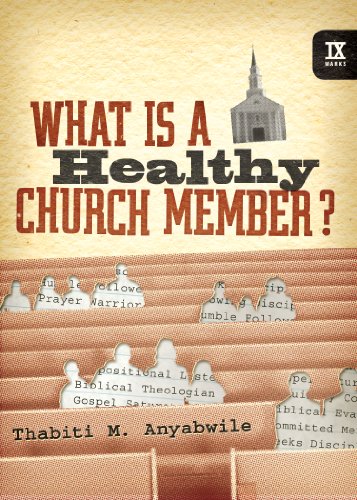What does it look like to be a healthy church member? Is there a place for ordinary Christians to contribute to the health and flourishing of their local churches?
We’re constantly catechised to believe that a God-honouring Christian life can be lived privately.
In today’s world, we are constantly catechised to believe that a fulfilling and God-honouring Christian life can be lived privately. The church has been likened to a shopping mall, where people go for spiritual goods before returning to everyday life. This individualistic and consumer-driven mentality has fostered unhealthy churches, which promote man-centred worship, and man-centred church leadership, with a bent on cultural conformity instead of the pursuit and proclamation of the glory of God.
What we need is two-fold:
- A Biblical understanding of what it means to find and belong to a God-glorifying, gospel-centred, and healthy local church, which has been ably addressed in other books from 9Marks;
- A Practical understanding of what makes a healthy church member, which is the focus of Anyabwile’s packed little book, What is a Healthy Church Member?
The latter of the above will be the focus of this review.
Healthy Church Membership
What is a Healthy Church Member? is written with precision, clarity, biblical depth, and profound relevance to the local church member. In it, Anyabwile seeks to convince the reader that healthy church membership is a call to a deliberate and dutiful pursuit of Christlike maturity, gospel unity, and the proclamation and demonstration of the gospel, to the glory of God. To develop that theme, Anyabwile surveys 10 marks of the healthy church member. And he arranges these into three foundational categories:
Anyabwile challenges the Christian to practical Christian living.
- A healthy church member adheres to a gospel-centered blueprint in their engagement with God’s word
- A healthy church member displays a gospel-centered commitment to the local church in their relationship with God’s people
- A healthy church member is dedicated to God-glorifying growth on their journey toward Christlikeness.
Let’s consider each of those in turn.

What Is a Healthy Church Member?
Thabiti M. Anyabwile
God intends for us to play an active and vital part in the body of Christ, the local church. He wants us to experience the local church as a home more profoundly wonderful and meaningful than any other place on earth. He intends for his churches to be healthy places and for the members of those churches to be healthy as well. This book explains how membership in the local church can produce spiritual growth in its members and how each member can contribute to the growth and health of the whole.
1. A Gospel-Centred Blueprint
What is the church member’s posture towards God’s word? The faithful preaching and teaching of God’s word, through God’s power, produces God’s people in conversion, grows them in discipleship, and is the means and motivation for God’s people to proclaim him. So, in the first three chapters the author ably challenges readers to grow in their handling of God’s word. A healthy church member will be what Anyabwile calls “an expositional listener” in their engagement with the preached word.
Expository listening prevents churches from becoming man-centred or deceived by false gospels.
What does that mean? What is an expositional listener? Anyabwile writes, “It is listening for the meaning of a passage of scripture and accepting that meaning as the main idea to be grasped for our personal and corporate lives as Christians” (p19). While many books have been written with an emphasis on expository preaching, the skill of expository listening is also crucial to Christian growth. Among many other benefits highlighted in the book, expository listening guards the Church against the “itching ear.” It also prevents churches from becoming man-centred or deceived by dangerous and destructive false gospels. The expositional listener is increasingly equipped to discern truth from error.
Linked with that, Anyabwile calls for church members to build a stronger biblical theology framework. Like expositional listening, this is crucial for handling God’s word. A healthy church member is a biblical theologian. Biblical theology is the ability to see the overarching story of the Bible and how its various parts fit together. “Jesus and the apostles did not need the New Testament to proclaim the gospel,” writes Anyabwile. “They relied on the Old Testament and understood that the Old Testament scriptures pointed to Jesus (Luke 24:27, 44-45). The biblical theologian follows in the steps of Jesus and the apostles by mastering the unity of scripture, seeing Christ and the gospel throughout” (p31).
2. A Gospel-Oriented Commitment
Next, Anyabwile highlights the necessity and sufficiency of the gospel for the Christian life. Many today think the gospel is only essential for unbelievers. They see it as the door that gets you into the household of God. But Anyabwile reorients our thinking about the gospel. He highlights that the gospel is the very message that both forms the house of God and upholds it. He writes, “The gospel distinguishes the church from the world, defines her message and mission in the world, and steels her people against the fiery darts of the evil one and the false allurements of sin” (p39).
The gospel forms the household of God and upholds it.
Anyabwile then challenges the Christian to know and believe the gospel; grow in their understanding of it; and guard the gospel. This gospel-oriented commitment is first seen clearly in the believer’s conversion. This radical change begins with the genuine conviction of sin, leading to a reliance on the Lord Jesus Christ for salvation (faith); and a turning from sin to the pursuit of holiness (repentance). The gospel message is one of hope. It bears good tidings to the lost as well as pilgrims on the way.
3. A God-Glorifying Growth
The gospel produces growth. This means growth is not in the structures of the church. It’s in the lives of the people. This means churches should be less concerned about ministry models and growth strategies. Instead of prizing pragmatism and practical guides for church growth, they should prioritise their members’ spiritual growth.
Instead of prizing practical guides for church growth, churches should prioritise their members’ spiritual growth.
In the final third of his book, Anyabwile challenges the Christian to practical Christian living as an objective trajectory towards healthy church membership. A healthy church member is one who regularly attends church services and members’ meetings. They actively engage in scripture both at a personal level and corporately. They pray for each other.
A healthy church member will also actively seek to build discipleship relationships, spurring one another toward love and good deeds. They will only honour God-given authority. But they will also practice biblical discernment, guarding the gospel from any corruption. They will humbly submit to the Lord’s discipline as it is exercised through the church. In all these, their gospel-shaped minds and hearts will continually remind them that all of these are only possible through a faith-filled trust in Christ, always at work in us.
Become This Kind of Church Member
Our age of increasing individualism defies the above. But God calls his people to selflessly commit themselves to one another. Thabiti Anyabwile has provided the church with an invaluable resource. His presentation is both rigorously biblical and pastorally sensitive. Chapter after chapter, he exhorts his readers to draw confidence from the gospel and demonstrate it in their lives.














